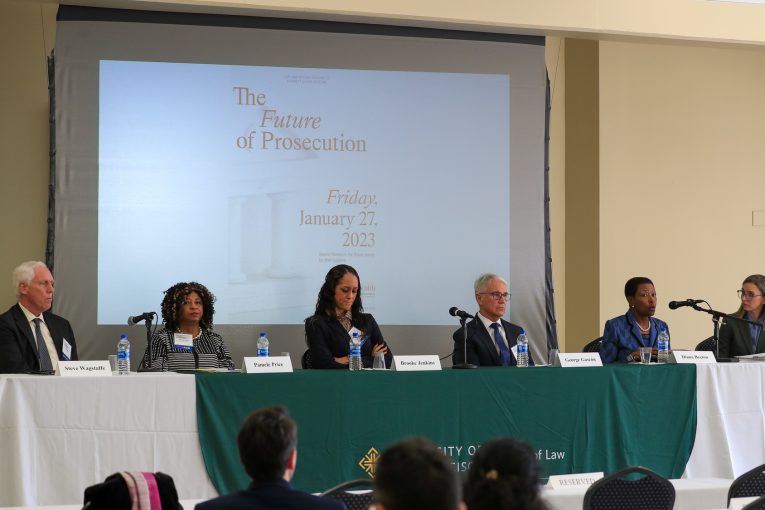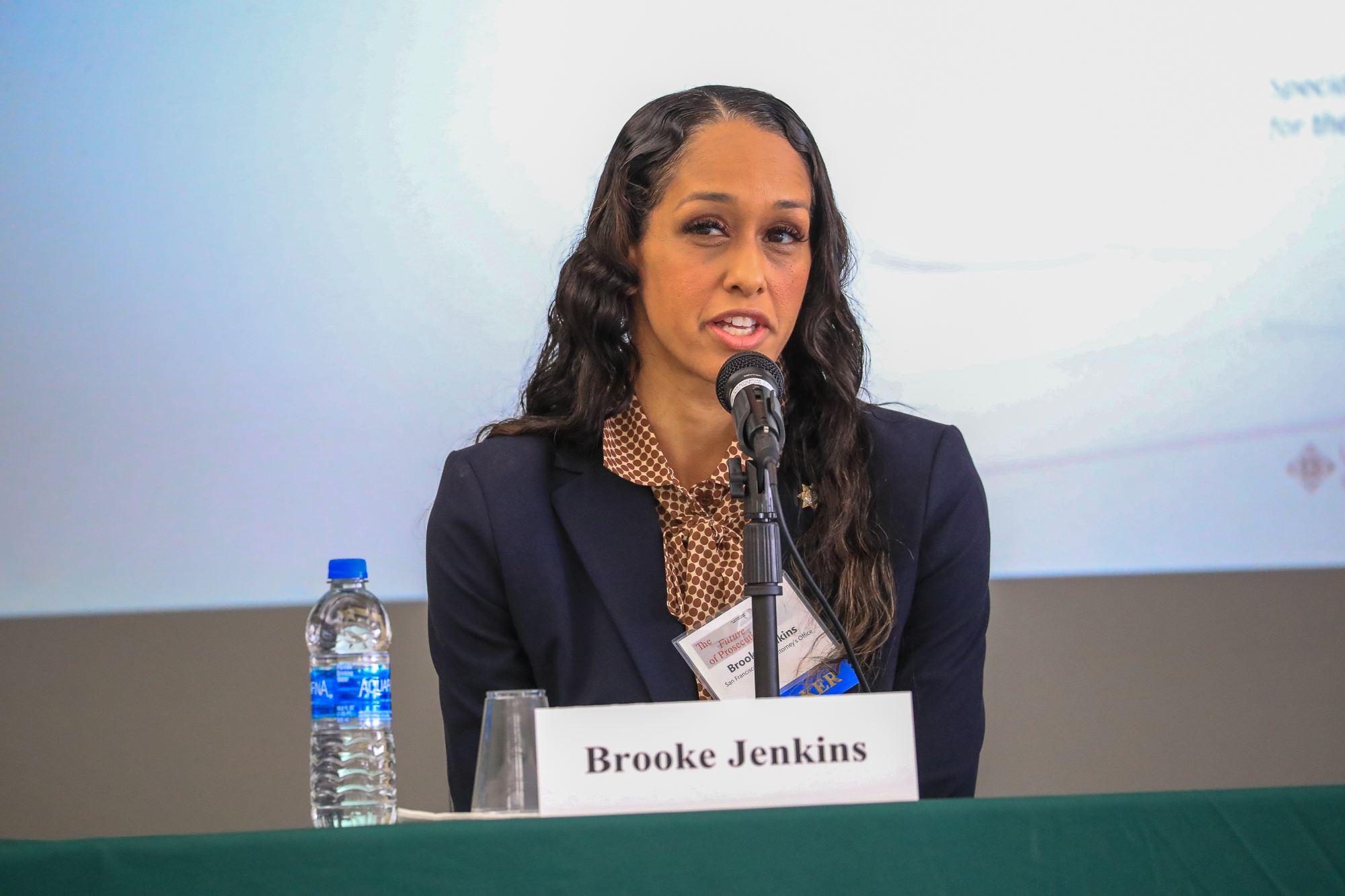

By David M. Greenwald
Executive Editor
San Francisco, CA – It was a diverse panel at USF Law School on Friday—five days ranging from the veteran Steve Wagstaffe who started in the 70s to Pamela Price who started this month. The law school held a symposium, “The Future of Prosecution” and the opening panel was worth the price of admission—we saw a new floor for reform, but also the clash of ideas between LA DA George Gascón and San Francisco DA Brooke Jenkins.
San Mateo DA Steve Wagstaffe, having to now deal with a mass shooting aftermath earlier in the week, represented a fairly traditional DA and approach to his office.
But his insight gives one a notion for just how far the floor of the reform movement has changed things.

He explained, “I’ve been following this for 45 years and it has changed in the last decade, 2011. And there are variety of reasons that have provoked the change into criminal justice reform.”
Overall, he believes it is for the good, as he said, “it has been a good effect because what we’re doing is we’re looking at people to say, what can we do to try and change lives?”
Like many places, one of the biggest issues is how to address things like low level crimes and  mental illness.
mental illness.
“In my county jail, over 53% of the people that are in there are receiving mental health treatment once they get into the facility,” Wagstaffe explained. “Our jails that become the biggest mental health institutions in the state of California.”
While he said he agrees with finding alternatives to get people out of the criminal justice system, he also pointed out, “Do you know who brings us cases on some low level and says, please prosecute. It’s our behavioral health people [in the] county. And the reason they’re doing it is that they have tried, we collaborate with them, but they’ve tried everything they can on the street to get people who will voluntarily get treatment. And many people who just don’t, a high percentage of people just don’t want it.”
He later added, “We don’t want these in the system. Not because we don’t want to spend taxpayer dollars on it, but there’s a better way.”
If Wagstaffe represents the change in the old school approach to prosecuting, DAs like Contra Costa’s Diana Becton, LA’s George Gascón and newly-elected Alameda DA Pamela Price are pushing for systemic change in the system.

Gascón argued that “lengthy incarcerations do not have an impact beyond the warehousing of an individual.”
The problem is that “unless you’re going send somebody to prison for the rest of their life, if they’re coming back, about 95% of the people that we incarcerate come back, they don’t generally [improve] in place, because rehabilitation really hasn’t been imbedded in our carceral systems. So people come out of prisons and jail generally are worse than when they went in.”
Gascón said that “you can’t escape the history of enhancements. You can’t can’t escape how they’ve been used, the racial impact that they have had.”
He noted that “ I don’t believe in the death penalty, so the death penalty so long as I’m the DA will be off the table as it was here in San Francisco. But we do consider life without the possibility parole.”
He noted that when you become a prosecutor you raise your hand and you swear that you will support the constitution, and you will support local laws, but he said… “there’s never a conversation about ensuring that you prevent harm.”
He said, “I believe that we as prosecutors have a similar obligation.”
For Gascón, “Mental health, substance dependence, do not get better when you are in jail.” He added, “ And contrary to all the talk that you heard about drug courts and all stuff, and I know some of you will probably think I’m being a heretic, that data doesn’t support that those solutions really work. They have very limited application.”
He earned the biggest applause of the day when he attacked racial inequities.
Gascón said, “And in the meantime, we continue to lower incarcerate Black and Brown people at levels that will be considered inhumane by any standard. Seven percent of the population is black. You walk into any of our jails and prisons and nearly 50% of the men and women that are incarcerated are Black, I refuse to believe that Black people are more likely to be a criminal than anybody else.”
He concluded to great applause, “Honesty regardless of political consequences is important.”

It was San Francisco DA Brooke Jenkins who pushed back, arguing that you are “not doing your job as a prosecutor” when “you eliminate victims of crime from the conversation that we have about resolving cases.”
She said, “I will tell you that the data shows is that the majority of the victims of crime are also Black and Brown people. My people, the people that look like me.”
She continued, “And what you’ll hear when you go into the Black community, into the Latino community is that we historically have always known and expected to be disadvantaged when we are charged with the crime, every time we walk in, we know right, we’re going to get the shaft, we’re going get the short end of the deal. But what we have expected when we are victims is that the DA’s office and wherever we live, will go into court and will fight for justice for us. And what now victims are being left with is holding the bag.”
She added “there are really terrible people in our society, I’m sorry to say it, we deal with serial rapists, serial child molesters, serial murderers.”
Jenkins argued, “You don’t want me to eliminate my tools when that person comes across your child, when that person comes across your mother and murders them, you want me to look at those tools and say, what is appropriate in this circumstance for this situation, for everybody involved.”
But both Contra Costa DA Diana Becton and Alameda DA Pamela Price—both also Black women elected prosecutors—had a different view.

Becton said, “It’s not always a Black and white question about how pieces are being resolved.” She noted that there have to be “thoughts about the tools that we have as prosecutors in our toolbox” because when it comes to problems like homelessness, mental illness, and drug addiction, “we’ve learned over time and the data has shown us that we really can’t prosecute our way out of those types of problems and issues.”
She said, “I’m very glad that George brought up the issues of race and disparity and equity and fairness in our system, because those are also factors that we have to take into account in the larger picture of how we’re affecting our communities.”
She added “in the last 40 to 50 years we have become the most over incarcerated country in the world. And we can’t hide from the fact that most of the people, as George mentioned, who are sitting in our jails are Black and Brown people. And so there we have to be able to review our policies, review our review, our decision making to see if we are contributing to those disparities in our system.”

Pamela Price noted that, while the panel and the audience was diverse, it’s an exception.
She said, “Our DA’s offices are not diverse. Our law schools are not diverse. I started practicing criminal defense law in Bayview Hunters Point in San Francisco before there was a Gascón and before there was Brooke Jenkins. And I can tell you, going to court every day at the Hall of Justice, I felt like all I saw was Black and Brown people being railroaded through the criminal justice system.”
She quipped, “And in 2023, one of our new employees, a Black man, went to court last week and he walked out of that courtroom in Alameda County in 2023 and said, it looks like a slave ship to me. We are still there.”
She said, “A lot of it is prosecutorial discretion. Let me be clear. And so I recognize that I am operating in an environment that has been often fundamentally hostile to the interest, not only of the Black and Brown people, but the interest of our community.”
She argued, “We also have to change hearts and minds of who we’re going to be working with in that office. My DA’s office prosecutes over 40,000. We look at over 40,000 cases every year. I can’t look at them individually. I can’t intervene in every individual case. That means I’ve got to have a workforce and a team across the board that is committed to the vision.”
She said that “our mission is to change how we do justice, how we administer justice in Alameda County. But fundamentally we have to recognize that these offices have done more harm, have done more harm than good, certainly in Alameda County. That is our legacy.”

